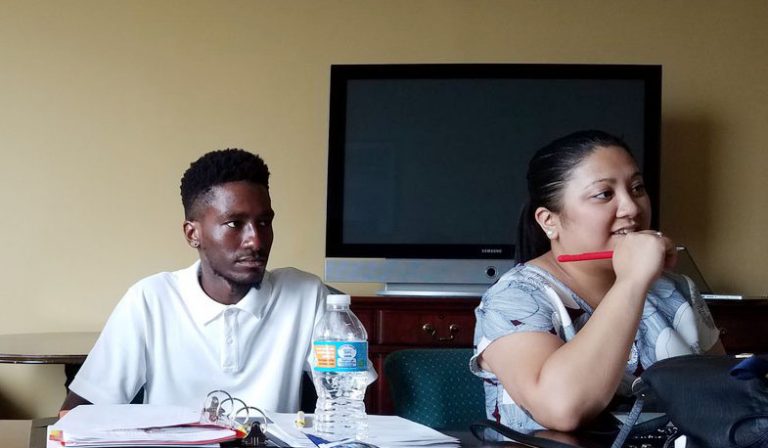This past summer, Old Dominion University (ODU) hosted a summer research team led by Norfolk State University (NSU) faculty Dr. Camellia Okpodu and Dr. Bernadette Holmes as part of an interdisciplinary, multi-institution collaborative summer research project.

The project was titled “A Systems Approach: Developing Cross-Site Multiple Drivers to Understand Climate Change, Sea-level Rise and Coastal Flooding for an African American Community in Portsmouth, VA.” Dr. Okpodu, Professor of Biology, led biological and ecological aspects of the project and Dr. Holmes, Professor of Sociology and Criminal Justice, led the sociological part of the project. Read more about the research in this Q&A.
Funding for the project came from the U.S. Department of Homeland Security (DHS) Summer Research Team (SRT) Program. The program aims to increase and enhance the scientific leadership at Minority-Serving Institutions (MSIs) in research areas that support the mission and goals of DHS.
The project included five students, three from NSU and two from ODU:
- Raisa Barrera, Graduating Senior, Biology (NSU)
- Mikel Johnson, Rising Senior, Sociology (NSU)
- Bryan Clayborne, Rising Senior, Sociology (NSU)
- Donta Council, Doctoral student, Public Administration and Policy (ODU)
- Isaiah Amos, Master’s student, Ecological Sciences (ODU)
The ODU team, most of whom are part of a DHS Coastal Resilience Center of Excellence (CRC) project, included Principal Investigator Dr. Larry Atkinson, Dr. Wie Yusuf, Dr. Michelle Covi, Dr. Joshua Behr and Dr. Gail Nicula. The researchers are part of the ODU Resilience Collaborative. The ODU graduate students were sponsored by the DHS Coastal Resilience Center of Excellence.
Dr. Okpodu developed a questionnaire for the Chesapeake Bay region’s minority populations, seeking to learn more about why those populations are considered to have a lower affinity for the environment and environmental resources than the general population.
Dr. Holmes developed a framework for studying the views of African-Americans about sea level rise and coastal flooding in the Hampton Roads area. Evidence shows that minority communities are disproportionately impacted by natural hazards, including coastal hazard threats. Both professors plan further work to explore their frameworks.
The ODU researchers provided guidance and feedback, served as a resource for engaging the local community, provided guidance on data management and supervised ODU graduate students participating in the multi-institutional project teams.
The summer research project builds on work done by other researchers at ODU on the disproportionate impact of flooding on low-resource communities, and their adaptation to flood events, Dr. Wie Yusuf of ODU said.
“The collaborative work with NSU was helpful in that it highlighted some key areas related to environmental justice and social justice, particularly as it relates to impacts of sea level rise on under-resourced communities such as the African-American community in Portsmouth,” Dr. Yusuf said.
Student participant Barrera said the new skills she gained during the summer will help her future educational and research efforts.
“This research experience afforded me a hands-on opportunity studying plant DNA and physiology and an opportunity to gain a deeper understanding of how sea-level rise and coastal flooding effect the gene expression of native coastal plants,” Barrera said. “Our research provides data that will bring understanding to how Virginia native coastal plants – which protect our coastline and vulnerable communities and ecosystems – respond to sea-level rise and flash flooding induced by climate change. Millions of Americans live in coastal communities that have ecosystems that can be negatively affected by flash flooding and sea-level rise.”
The Hampton Roads region, which includes 17 jurisdictions, has varying vulnerabilities and responses to flooding and sea level rise, she said. Working with NSU will help to spread resources across universities in the region, and coincides with another ODU project to network with researchers at the region’s other universities and community organizations.
Millions of Americans live in coastal communities that have ecosystems that can be negatively affected by flash flooding and sea-level rise.
“In terms of future collaborations, I think we’ve just begun to scratch the surface,” Dr. Yusuf said. “In the short-term, I envision the ODU-NSU team to continue to collaborate on projects assessing the vulnerability of under-resourced communities such as those in Portsmouth. In the longer term, the connection to social justice and environmental justice is what really resonated with the ODU team, and I foresee us continuing to work in this area.”
This partnership is part of a Department of Homeland Security (DHS) program managed by Oak Ridge Affiliated Universities (ORAU), which solicits competitive proposals from MSIs to perform summer research in residence at one of the DHS Centers of Excellence (COEs) under the mentorship of a COE researcher.
The student researchers presented outcomes of their summer work in late July. A recording of the complete presentation is available on the ODU website. Individual student presentations are also available:
- Raisa Barrera – video, slides
- Bryan Clayborne – video, slides
- Mikel Johnson – video, slides
- Donta Council – video
- Isaiah Amos – video, slides
Slides from Dr. Okpodu can be viewed here and from Dr. Holmes can be viewed here.
